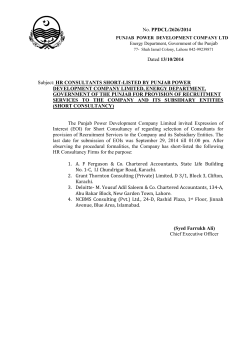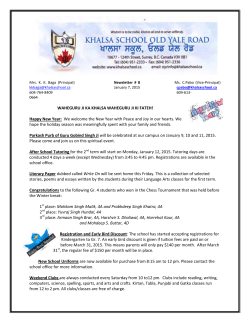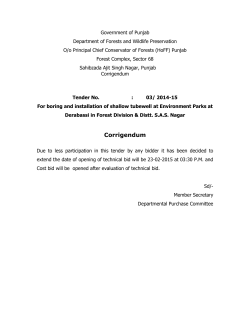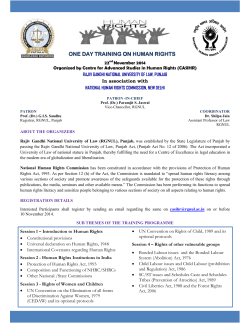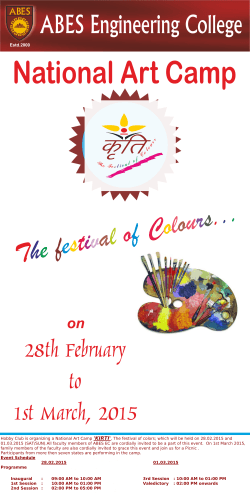
Resolution On Observing the Birth Centenary of
COMMUNIST PARTY OF INDIA (MARXIST) 21st Congress Samar Mukherjee Nagar Visakhapatnam, April 14-19, 2015 Resolution On Observing the Birth Centenary of Harkishan Singh Surjeet The 21st Congress of the Communist Party of India (Marxist) calls for the observance of the birth centenary of Comrade Harkishan Singh Surjeet, one of the Navaratnas who founded our Party during the year culminating on 23rd March 2016. The seven and a half decades-long political life of Harkishan Singh Surjeet began with his staunch fight against British colonial rule. He played a pioneering role in developing the peasant movement and the Communist Party in Punjab before emerging as a national leader of the Communist Party of India and the All India Kisan Sabha. It culminated with his leading role in the CPI(M) for an eventful four decades. Surjeet began his revolutionary career influenced by the martyrdom of Bhagat Singh. He hoisted the tricolour in March 1932 at the district court in Hoshiarpur at the age of 16. He was arrested and sent to a reformatory school for juvenile offenders. He came in touch with the early Communist pioneers in Punjab after his release. He joined the Communist Party in 1934 and became a member of the Congress Socialist Party in 1935. He was elected as the secretary of the Punjab State Kisan Sabha in 1938. In common with the pioneering Communist leaders, Surjeet displayed amply the capacity to sacrifice and undergo difficulties. He spent ten years in jail, of which eight were in the pre-independence period; he also spent eight years underground. Surjeet was elected to the Central Committee and Polit Bureau of the Communist Party of India at the Third Congress of the Party in January 1954. He continued in the leadership of the CPI till the split in 1964. Surjeet was one of the leaders who fought against revisionism and constituted the core of the leadership who went on to form the CPI(M). His rich experience in developing the peasant movement and building the Party led him to shun Left sectarian positions whenever such deviations arose in the Communist movement. He had a life-long association with the peasant movement. He led the anti-betterment levy struggle of the farmers in Punjab in 1959. He served as the President and General Secretary of the All India Kisan Sabha for a long period. Surjeet was elected to the Central Committee and Polit Bureau of the CPI(M) at the Seventh Congress in 1964 and he continued in these positions till the Nineteenth Congress of the Party. From 1992 to 2005, he served as the General Secretary of the Party. In these four decades, 1 Harkishan Singh Surjeet made a key contribution to the Party’s programmatic and tactical policies. He was a master tactician who could translate the Party’s political line into practice, implementing it with great skill and innovation. His was a life-long fight against communalism. He was one of the first leaders who recognized the threat posed by the rise of the communal forces to the secular principle of the Indian State. Surjeet played a remarkable role in the defence of national unity and in formulating policies to counter the threat from the divisive forces. His firm stance and leadership in fighting against Khalistani terrorism in Punjab and the sacrifice made by over 200 Communists in fighting extremism constitutes a glorious chapter. From the late fifties, Surjeet was involved in tackling the problems of Jammu & Kashmir. Under his leadership, the CPI(M) expressed firm solidarity with anti-imperialist struggles and national liberation movements. He made a notable contribution to the solidarity activities during the Vietnam liberation struggle, the Palestinian movement and the Cuba solidarity campaign. Surjeet played an important role in making the CPI(M) the largest contingent of the Left movement in the country. He always stressed the fundamental importance of critically examining the Party’s ideological and political positions on the basis of Marxism. After the collapse of the Soviet Union in the nineteen nineties, he guided the Party in arriving at correct positions learning from the experience of the past. He worked tirelessly for the defence of democratic and secular values and to see that India maintained its non-aligned and independent foreign policy. The 21st Congress resolves to observe the birth centenary through multifarious events like seminars, discussions on the role of Communists in the anti-imperialist and anti-feudal struggles, publications particularly highlighting the lessons of the struggle against communalism and for strengthening the unity of our people in facing the current challenges. ** 2
© Copyright 2026
